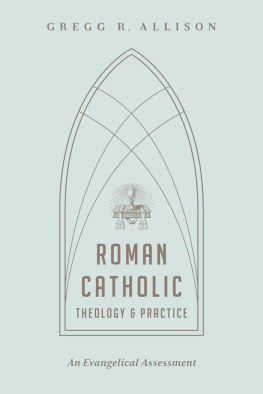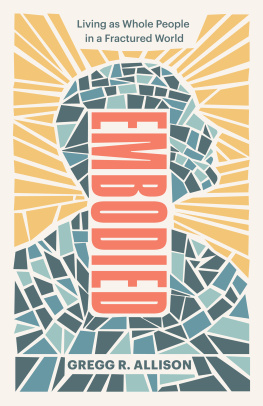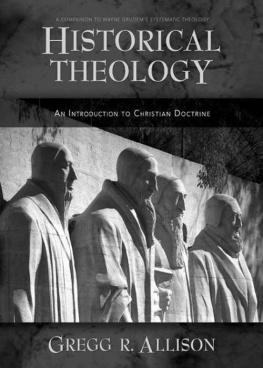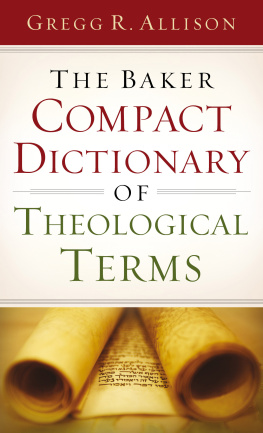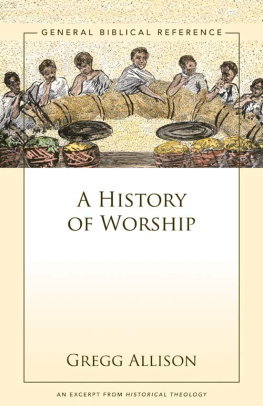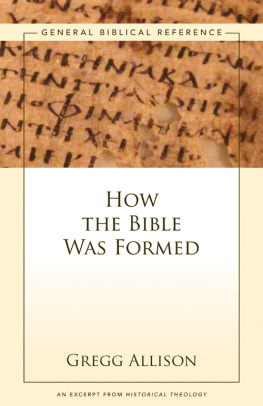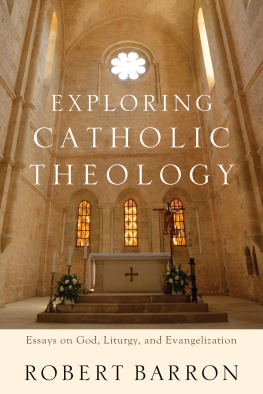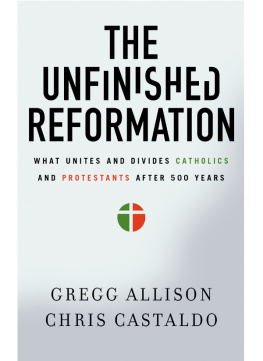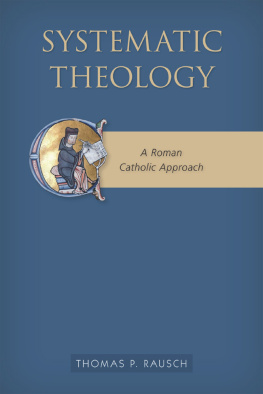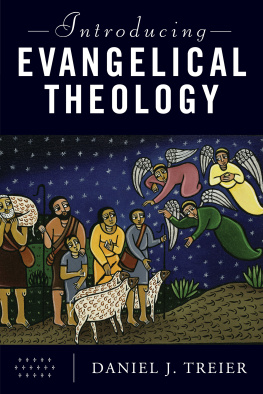Gregg R. Allison - Roman Catholic Theology and Practice: An Evangelical Assessment
Here you can read online Gregg R. Allison - Roman Catholic Theology and Practice: An Evangelical Assessment full text of the book (entire story) in english for free. Download pdf and epub, get meaning, cover and reviews about this ebook. year: 2014, publisher: Crossway, genre: Religion. Description of the work, (preface) as well as reviews are available. Best literature library LitArk.com created for fans of good reading and offers a wide selection of genres:
Romance novel
Science fiction
Adventure
Detective
Science
History
Home and family
Prose
Art
Politics
Computer
Non-fiction
Religion
Business
Children
Humor
Choose a favorite category and find really read worthwhile books. Enjoy immersion in the world of imagination, feel the emotions of the characters or learn something new for yourself, make an fascinating discovery.
- Book:Roman Catholic Theology and Practice: An Evangelical Assessment
- Author:
- Publisher:Crossway
- Genre:
- Year:2014
- Rating:4 / 5
- Favourites:Add to favourites
- Your mark:
- 80
- 1
- 2
- 3
- 4
- 5
Roman Catholic Theology and Practice: An Evangelical Assessment: summary, description and annotation
We offer to read an annotation, description, summary or preface (depends on what the author of the book "Roman Catholic Theology and Practice: An Evangelical Assessment" wrote himself). If you haven't found the necessary information about the book — write in the comments, we will try to find it.
Roman Catholic Theology and Practice: An Evangelical Assessment — read online for free the complete book (whole text) full work
Below is the text of the book, divided by pages. System saving the place of the last page read, allows you to conveniently read the book "Roman Catholic Theology and Practice: An Evangelical Assessment" online for free, without having to search again every time where you left off. Put a bookmark, and you can go to the page where you finished reading at any time.
Font size:
Interval:
Bookmark:
- 8 The Celebration of the Christian Mystery (Part 2, Section 2, 259
Chapter 1, Articles 12) - 9 The Celebration of the Christian Mystery (Part 2, Section 2, 299
Chapter 1, Article 3) - 10 The Celebration of the Christian Mystery (Part 2, Section 2,327
Chapter 2, Articles 45) - 11 The Celebration of the Christian Mystery (Part 2, Section 2,357
Chapter 3, Articles 67)
Allison, HT | Gregg R. Allison, Historical Theology: An Introduction to Christian Doctrine (Grand Rapids, MI: Zondervan, 2011). |
Allison, SS | Gregg R. Allison, Sojourners and Strangers: The Doctrine of the Church (Wheaton, IL: Crossway, 2012). |
ANF | Ante-Nicene Fathers, ed. Alexander Roberts, James Donaldson, Philip Schaff, and Henry Wace, 10 vols. (Peabody, MA: Hendrickson, 1994). |
Calvin, Institutes | John Calvin, Institutes of the Christian Religion, ed. John T. McNeill, trans. Ford Lewis Battles (Philadelphia: Westminster, 1960). (See also the listings below for LCC 20 and LCC 21; references for the Institutes are provided in those sources as well.) |
CCC | Catechism of the Catholic Church (New York: Doubleday, 1995). |
De Chirico | Leonardo De Chirico, Evangelical Theological Perspectives on Post-Vatican II Roman Catholicism. Religions and Discourse, vol. 19 (Bern: Peter Lang, 2003). |
Grudem, ST | Wayne Grudem, Systematic Theology: An Introduction to Biblical Doctrine (Grand Rapids, MI: Zondervan, 1994, 2000). |
Heppe | Heinrich Heppe, Reformed Dogmatics, ed. Ernst Bizer, trans. G. T. Thomson (London: Allen & Unwin, 1950). |
Kreeft | Peter Kreeft, Catholic Christianity (San Francisco: Ignatius, 2001). |
LCC 20 | John Calvin, Institutes of the Christian Religion, ed. John T. McNeill, trans. Ford Lewis Battles (Philadelphia: Westminster, 1960), in John Baillie, John T. McNeill, and Henry P. Van Dusen, gen. eds., Library of Christian Classics, 26 vols. (Philadelphia: Westminster, 1960), vol. 20. |
LCC 21 | John Calvin, Institutes of the Christian Religion, ed. John T. McNeill, trans. Ford Lewis Battles (Philadelphia: Westminster, 1960), in John Baillie, John T. McNeill, and Henry P. Van Dusen, gen. eds., Library of Christian Classics, 26 vols. (Philadelphia: Westminster, 1960), vol. 21. |
LW | Martin Luther, Luthers Works, ed., Jaroslav Pelikan, Hilton C. Oswald, and Helmut T. Lehmann, 55 vols. (St. Louis: Concordia, 19551986). |
NPNF1 | Nicene and Post-Nicene Fathers, ed. Alexander Roberts, James Donaldson, Philip Schaff, and Henry Wace, 1st ser., 14 vols. (Peabody, MA: Hendrickson, 1994). |
NPNF2 | Nicene and Post-Nicene Fathers, ed. Alexander Roberts, James Donaldson, Philip Schaff, and Henry Wace, 2nd ser., 14 vols. (Peabody, MA: Hendrickson, 1994). |
Schaff | Philip Schaff, Creeds of Christendom, 3 vols. (New York: Harper, 18771905). |
Schmid | Heinrich Schmid, The Doctrinal Theology of the Evangelical Lutheran Church, trans. Charles A. Hay and Henry E. Jacobs (Minneapolis: Augsburg, 1899). |
VC II-1 | Austin Flannery, gen. ed., Vatican Council II: Volume 1, The Conciliar and Post-Conciliar Documents, new rev. ed. (Northport, NY: Costello; and Dublin: Dominican, 1998). |
VC II-2 | Austin Flannery, gen. ed., Vatican Council II: Volume 2, More Post-Conciliar Documents, new rev. ed. (Northport, NY: Costello; and Dublin: Dominican, 1998). |
Comically speaking, the genesis of this book occurred when I, as a five-year-old, was told by a similarly young (pre-Vatican Council II) Catholic neighbor girl that I was headed straight to hell because I wasnt Catholic. Greatly upset and fearing for my eternal destiny, I asked my parents if we could go to church, and they promptly responded by taking me to the local United Methodist church. Though that choice did nothing to change the neighbor girls assessment of and warning about my future condemnation, it at least started me down the Protestant pathway. After nurturing me on the works of Martin Luther, Huldrych Zwingli, John Calvin, John Wesley, and many others, this road has brought me to the place where I am today: an evangelical systematic theologian of the Reformed Baptist variety.
Seriously, however, the origin of this book began in May 1976, when my fiance (now wife, Nora) and I were visiting a businessman in Chesterton, Indiana, near South Bend. We had received permission from Campus Crusade for Christ (now Cru) to begin raising support for our future campus ministry with that parachurch organization. During our conversation, in which Nora and I presented our upcoming work, the businessman jokingly exclaimed, Wouldnt it be interesting if the two of you were assigned to be Cru staff at the University of Notre Dame. After a hearty laughSure, a Protestant missionary movement on the campus of the premier Catholic university in the United States!we concluded our presentation and said our thanks and good-byes. Getting into our car to return home, Nora (from the passenger side) and I (from the drivers side) looked at each other and, together, with a strong, divinely given conviction, said, God is calling us to the University of Notre Dame.
After our wedding, honeymoon, and the commencement of our preparation as Cru staff, we received a Placement Request Form as part of our training. One of the questions on this form had to do with where we hoped to be placed. We promptly wrote in our assignment preference: the University of Notre Dame. Soon after receiving our response, Cru leaders responsible for staff placement called us in for a little chat. They were quite intrigued that we wanted to go to Notre Dame (ND), as the Cru ministry was just beginning on that campus, and they were looking to assign more staff to join the small initial team. Nora and I, however, failed to meet their three qualifications: we did not come from a Catholic background, we were not veteran staff (who usually are responsible for starting new campus ministries), and we did not have children (so as to be in a similar season of life as the Cru staff couple already working at ND). Strike one. Strike two. Strike three. The Allisons were not going to be Cru staff at Notre Dame.
A bit later, to the same question on the second Placement Request Form, we wrote, the University of Notre Dame. Somewhat perturbed, our placement leaders called us in for another conversation, wondering what about the initial No, you are not going to be assigned to Notre Dame we didnt understand. They tried to comfort us with the possibility that we would end up at Notre Dame after we had been on Cru staff for a number of years, but they assured us ND was not in our immediate future. Of course, we assured them that we were willing to go anywhere they assigned us. But deep down inside lingered the firm conviction that God was calling us to Notre Dame.
Accordingly, when the third Placement Request Form was distributed a week or so later, our reply to the now infamous question was the University of Notre Dame. The placement leaders flustered and emphatic response to what seemed like an intractable stance on our part was, Perhaps God is calling you to Villanova or some other Catholic university, but you are not going to the University of Notre Dame!
Font size:
Interval:
Bookmark:
Similar books «Roman Catholic Theology and Practice: An Evangelical Assessment»
Look at similar books to Roman Catholic Theology and Practice: An Evangelical Assessment. We have selected literature similar in name and meaning in the hope of providing readers with more options to find new, interesting, not yet read works.
Discussion, reviews of the book Roman Catholic Theology and Practice: An Evangelical Assessment and just readers' own opinions. Leave your comments, write what you think about the work, its meaning or the main characters. Specify what exactly you liked and what you didn't like, and why you think so.

